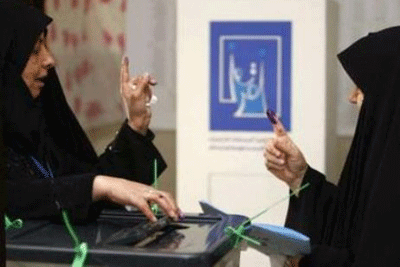Wafaa Hussein Mahmoud
Woman's Bureau of the CINU
Master of Political Science/in charge of woman's rights
The process of elections which will take place in the coming months is considered a milestone for the ability of political forces and factions that will stand as nominees to parliament, however, the parliament has passed the elections in the form of open list and multiple circles, other than all political interactions and struggles on vetoing the law of elections which baffled the Iraqi street and political forces, and the attempt to exploit it on the part of parties in order to reinstall the sectarian address and obtain public attraction in favor of non-national forces based on private interest criterion.
Unquestionably, the outcome of years passed in the life of the House of Representatives and Council of Municipalities was not in favor of the large parties and forces holding the reins of power, in view of the fact that these forces have failed to make the life of Iraqi individual any easier and to provide the basic services. Even that the Iraqi people have not witnessed any legal accountability held against any minister or major official in the state for violations, financial and administrative corruption rampant in all hinges of the state.
In addition, Iraq has not come up with well-defined economic investment plans to employ the workforce and as such unemployment has become the prominent feature, for unemployment is an illness wherever crime is there, security is missed and many qualifications and degree holders are becoming marginalized for groundless unfair reasons, likewise there was atrophy in Iraqi industry and agricultural production which turned Iraqi into a consumer and importer state instead of being an investor in industrial and agricultural areas.
Added to above, the mechanism of sectarian allocation which remained adhering to the political process all through the past years, in consequence of that Iraqi voters refrained from going to polls especially in the previous municipality elections.
However, the reconciliation which we used to hear about was only consensual attempts for one party or the other. Since the political process was built on consensus between political blocs and onto the simplest of decisions after all debates and political conflicts, and thus the quest to obtain a political consensus has become established at the expense of building the institutions of state in Iraq, and will these consensuses remain in control of the political process in Iraq and for how long? Is not much better to apply democracy, namely, the rule of majority, which includes all Iraqi shades?
Therefore, this period will be the most important to establish the democratic system instead of keeping the political process in the context of gains for one of the parties with removal and marginalization of the supreme interest of home, and devotion of sectarian allocation that is already established in all of the current political process.
The question that arises here: is it still possible to hold elections in the absence of political programs organizing the parties or their financing, besides vetoing the law of elections and for a number of times before being ratified, other than giving the Kurds guarantees and promises as regards Kirkuk on the part of the US president Barack Obama and the White House. Hence, all these events and others witnessed on the political Iraqi ground today have reduced the confidence of citizen in these forces and persevered in finding an outlet that may drive him out of his bitter reality.
Today, there emerged some blocs comprised of different Iraq components, political and tribal known figures, and formed political alliances, in this respect, Dr. Nahro, the Secretary General of CINU, has diagnosed the need of Iraq for a broad national front with gravity to lead the country's affairs and keep the country afar from the tunnel of sectarian and ethnic allocation via introducing Iraqi figures with well recognized national history, yet, deliberate political maneuvers practiced by some parties in the political process in order to disrupt an early issuance of the elections law resulted in a state of uncertainty reflected on the benevolent national efforts, whether out of desire to register political entities or join alliances; however, what happened during the last few weeks of different proclamations about alliances and mergers that have exhausted the thinking of most Iraqis, and cast their heavy shades on the political scene and subsequently facts have been revealed denoting that such proclamations were only an expression of certain persons and groups private interests before being real initiatives for the building of a national broad front advocated by broad sections of Iraqi people".
Hence, it is incumbent upon the Iraqi voter to acquire a considerable political awareness when it comes to exercising his rights in the coming elections, and to cast his valuable vote in favor of patriotic figures, forces of change and renewal that do not receive any regional support or liable to external pressures, and which look towards building a better future for the state of law and citizenship instead of the state of components; therefore, we all have to bring out the political process from the confinement of allocation and sectarian alignments, and have it erected on well-established pillars comprised of two main poles, forces in power manage the helm of rule and another on the opposition side watching and monitoring the former steps, and the order of these forces are founded on known political principles: leftist, conservative and center. Iraqi identity should take over the lead with due respect to other affiliations whether they were religious, ethnic or sectarian for the sake of building a successful democratic process.

